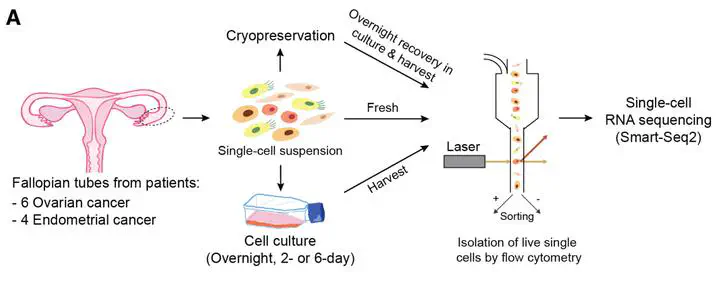Ovarian Cancer

We are working with the Ovarian Cancer Cell Laboratory led by Professor Ahmed Ahsour Ahmed to unlock the molecular mechanisms underlying high-grade serous ovarian cancer (HGSOC) using genomics and bioinformatics.
Premalignant SOX2 overexpression in the fallopian tubes of ovarian cancer patients
We have discovered premalignant overexpression of SOX2 in the fallopian tubes of ovarian cancer patients which was nearly ubiquitous in HGSOCs. This was also a common feature in women with BRCA1 and BRCA2 mutations prior to ovarian cancer initiation. Thus, our data has important implications for screening, although it will need additional clinical evaluation to test the feasibility of quantitative detection of SOX2 expression or the expression of its downstream targets for this purpose. You can read the original research paper here as well as media reports here and here.
The unmasking non-genetic heterogeneity through by single-cell sequencing of fallopian tube epithelial cells
More recently, we have used single cell sequencing to understand the inter-differentiation between cell states which promotes cancer cell survival under stress and fosters non-genetic heterogeneity (NGH). NGH is a surrogate of tumor resilience but its quantification is confounded by genetic heterogeneity. We showed that NGH can be accurately measured when informed by the molecular signatures of the normal cells of origin. We surveyed the transcriptomes of 4000 normal fallopian tube epithelial (FTE) cells, the cells of origin of serous ovarian cancer, and identified six FTE subtypes. We used subtype signatures to deconvolute SOC expression data and found substantial intra-tumor NGH that was previously unrecognized. Importantly, NGH-based stratification of ∼1700 tumors robustly predicted survival. Our findings lay the foundation for accurate prognostic and therapeutic stratification of SOC. You can read our Cancer Cell paper here and press coverage from Daily Mail.
Researchers: